Germany prepares for gas rationing as Schröder quits Rosneft
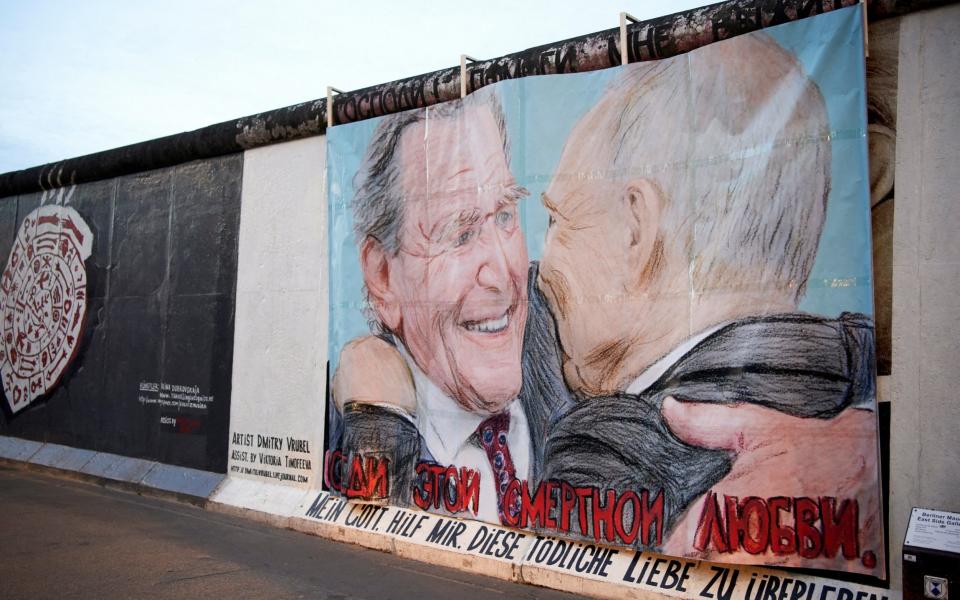
German regulators are drawing up plans to ration gas to the country's businesses in the event of Russia cutting off supplies.
The move would effectively shut down swathes of German industry and significantly worsen its economic plight.
It comes as former German Chancellor Gerhard Schröder stepped down as chair of Rosneft following a backlash over his refusal to distance himself from the Russian oil giant.
The company said Mr Schröder was stepping down alongside several other key executives including Matthias Warnig, a former Stasi officer and close friend to Putin.
Germany's Bundestag earlier this week voted to strip the former chancellor of his parliamentary privileges. Bundesnetzagentur, Germany’s energy regulator, admitted it could be forced to “cut supply of gas to some users to zero,” depending on the extent of any shortages.
Europe’s largest economy is heavily dependent on Russian energy imports but is having to prepare for cuts as Moscow’s war against Ukraine drags on and energy is used as a political weapon.
Russia halted gas supplies to Bulgaria and Poland last month and supplies from Russia to Finland are set to be cut on Saturday, following the country’s application to join Nato and refusal to pay in roubles as Russia has demanded.
Germany and the rest of Europe are also trying to reduce their reliance on Russian energy in order to stop filling Moscow’s coffers. The bloc typically gets about 40pc of its gas from Russia.
EU countries have been securing gas from areas such as Africa, Qatar and the US, but it remains uncertain to what extent the continent could cope without any Russian supplies.
Klaus Mueller, president of Germany's regulator, has said the size of the company, importance of the sector and potential economic losses would be taken into account when determining any rationing of gas supplies.
However, some analysts have warned the regulator will struggle to establish a coherent rationing list given the links between manufacturing supply chains, with unpredictable knock-on effects.
The state may pay companies to cut consumption. On Friday Finnish gas importer Gasum Oy said flows on a key pipeline from Russia would stop early on Saturday morning, a week after sales of electricity from Russia to Finland ended.
Finland gets most of its gas from Russia but gas only accounts for 5pc of its total annual energy consumption, making it less damaged by the shut off. It is also connected to the European gas network.
The European Commission this week urged member states to consider telling households to adopt energy saving measures such as slower driving speeds and turning down heating, in an effort to cut reliance on Russian supply.
05:09 PM
Wrapping up
That's all from us today, thank you for following! We shall see you after the weekend but, before you go, have a look at the latest stories from our reporters:
World has just ten weeks' worth of wheat left after Ukraine war
Sadiq Khan to sting thousands more drivers with emissions charges in ULEZ expansion
05:07 PM
Germany struggles to find alternatives to Russian gas as Qatar is maxed out
Germany’s efforts to secure more natural gas from Qatar yielded only modest results, with the Persian Gulf energy giant unable to offer any extra flows for another two years as output is already at full tilt.
Qatar said liquefied natural gas could be sent to Germany from a new US plant it has a stake in, from 2024. An expansion project at home won’t begin operations until at least 2026, later than expected.
Europe is racing to find alternatives to gas from Russia, the continent’s biggest supplier, after the country’s invasion of Ukraine. Imports of LNG from Qatar and the US, the world’s largest exporters, are a key part of that solution.
“Whatever we can provide for energy security in Europe, even during this period, we will make sure that we can provide,” Qatar’s emir, Sheikh Tamim bin Hamad Al Thani, told reporters at a press conference in Berlin.
04:48 PM
World has just 10 weeks' worth of wheat stockpiled
The world has just 10 weeks' worth of wheat stockpiled after Vladimir Putin's invasion of Ukraine disrupted supplies from the "breadbasket of Europe". Tom Rees and Louis Ashworth have the story:
The UN has been warned that global wheat inventories have fallen to their lowest level since 2008 as food supplies are rocked by a “one-in-a-generation occurrence”.
Official government estimates put world wheat inventories at 33pc of annual consumption but stocks may have slumped to as low as 20pc, according to agricultural data firm Gro Intelligence. It estimates that there are only 10 weeks of global wheat supply left in stockpiles.
Russia and Ukraine account for around a quarter of the world’s wheat exports and the West fears Mr Putin is trying to weaponise food supplies. Russia is on track for a strong wheat harvest this year, cementing Mr Putin’s control over the staple grain as bad weather spoils production in Europe and the US.
04:30 PM
FTSE 100 erases nearly all weekly declines
The FTSE 100 has rebounded as a move by China to support its economy lifted sentiment at the end of a rocky week for markets, while e-commerce firm THG soared after rejecting a takeover proposal.
The blue-chip index added 1.2pc, while domestically focussed FTSE 250 index added 0.8pc, erasing nearly all of their weekly declines.
Data earlier today showed British retail sales jumped unexpectedly in April, but the outlook for consumer spending remained resolutely downbeat as the cost-of-living crunch intensifies.
"The unexpected upturn in retail sales could be viewed as a positive sign that the consumer isn't as bruised as other data suggests," said AJ Bell financial analyst Danni Hewson.
"But digging into April's figures, the big uptick in food and drink spend in supermarkets might indicate that people are choosing their kitchen tables over pubs and restaurants as they look to save money."
04:10 PM
Turkish reserves lost ‘shocking’ $4.8bn in just one week
Turkey’s gross foreign-currency reserves fell the most this year, providing further evidence that an effort to support the lira is coming at an increasingly steep cost.
The stockpile shrank by $4.8bn (£3.8bn) in the seven days ended May 13, according to central bank figures published today. That brought total holdings, which exclude gold reserves, to a 10-month low of $61.2bn.
The weekly decline was “shocking” and a sign that Turkey is “unsuccessfully leaning against the wind,” said Cristian Maggio, the head of portfolio strategy at TD Securities in London.
Even with Turkish state banks occasionally intervening in foreign-exchange markets, the lira is this year’s worst performer in emerging markets against the dollar with a loss of over 16pc. It’s falling against the backdrop of strong demand for the greenback by Turkish corporates, which are trying to insulate themselves from inflation fueled by past episodes of currency depreciation and a rally in global commodities prices.
03:47 PM
Supermarket tankers fill up on Russian Diesel, says Greenpeace
Fuel tankers from several of the biggest supermarkets in the country have been spotted taking diesel from Russia, campaigners say.
Greenpeace photographed Tesco, Sainsbury's, Asda and Morrisons tankers at the Navigator Terminals on the banks of the River Thames in Essex.
The tankers picked up fuel just hours after a shipment of 33,000 tonnes of diesel was delivered to the site, Greenpeace said, although the terminal also deals with shipments from other countries.
Greenpeace campaigner Elena Polisano said: "Supermarkets were quick to remove Russian vodka from shelves and rename their chicken Kievs as chicken Kyivs.
"Customers will be outraged if supermarkets are asking them to donate to Ukraine at the till but passing their money to Putin at the pump."
The UK’s biggest supermarkets @Sainsburys @Tesco @Asda @Morrisons have been trying to show solidarity with Ukrainians - but they could take real action to stop funding Putin's war now?
They could stop buying Russian diesel and selling it to their customers. #OilFuelsWar
1/3 pic.twitter.com/oXgiVegppA— Greenpeace UK (@GreenpeaceUK) May 20, 2022
03:22 PM
Playtech continues takeover talks with TT Bond Partners
Playtech has said it is continuing to make "progress" in takeover talks with TT Bond Partners, almost four months after discussions first began over a deal.
The gambling technology business saw shares climb after it said the Hong Kong suitor now has a deadline of June 17 to confirm whether it will make a firm offer.
Playtech stressed that there is "no certainty" a bid will be made as it is conscious TTB started to consider the move "15 weeks" ago.
The group added that its independent board committee is still exploring options "for maximising shareholder value" and told investors its recent strong trading continued through April and into May.
03:07 PM
Handing over
That's all from me – thanks for following! Giulia Bottaro's in the driving seat until the weekend.
03:01 PM
Slovakia opens rouble account at Russian bank
Slovak state gas importer SPP has paid a bill for Russian natural gas in euros and has also opened a rouble account with Gazprombank – in effect accepting a payment scheme demanded by Moscow.
The EU has told member states they can keep buying Russian gas without breaching sanctions, but advised them not to open rouble accounts.
Payments for Russian gas have become an issue since Putin demanded that foreign buyers start paying in roubles.
Russia has cut supplies to Poland and Bulgaria for refusing to do so and is set to cut off Finland from tomorrow.
While the European Commission advised companies against opening rouble bank accounts at Gazprombank, as requested by the Kremlin, it has not explicitly said doing so would breach sanctions in its formal written guidance.
02:43 PM
HSBC's responsible investment chief attacks climate 'nut jobs'
In a rather surreal turn of events, HSBC has been forced to distance itself from one of its top responsible investment executive after he criticised the finance industry for worrying too much about the environment.
Stuart Kirk told a conference this morning: “Climate change is not a financial risk that we need to worry about. There’s always some nut job telling me about the end of the world.”
Mr Kirk, whose role means he is responsible for integrating ESG risks and opportunities for HSBC Asset Management, also took aim at former Bank of England Governor Mark Carney and other policy makers for talking up the risk from climate change.
He said: “I completely get that at the end of your central bank career there are still many, many years to fill in.
“You’ve got to say something, you’ve got to fly around the world to conferences, you’ve got to out-hyperbole the next guy. But I feel like it is getting a little bit out of hand.”
In another bizarre remark, the banking boss said humanity should be focused on adapting to a changing environment, pointing to the example of Miami.
He said: “Who cares if Miami is six meters underwater in 100 years, Amsterdam’s been six meters underwater for ages, and that’s a really nice place. We will cope with it.”
Nicolas Moreau, chief executive of HSBC’s asset management unit, said the remarks “do not reflect the views of HSBC Asset Management nor HSBC Group in any way”.
02:25 PM
Gerhard Schröder steps down as Rosneft chair

Former German Chancellor Gerhard Schröder has stepped down as chair of Rosneft following a backlash over his refusal to distance himself from the Russian oil giant.
The company said Mr Schröder was stepping down alongside several other key executives including Matthias Warnig, a former Stasi officer and close friend to Putin.
It comes after Germany's Bundestag this week voted to strip the former chancellor of his parliamentary privileges.
Mr Schröder's exit comes months after former politicians from other European countries cut their ties with Russian companies.
Read more on this story: How Gerhard Schröder led Germany into a love affair with Putin
02:10 PM
Nadine Dorries gets sheepish over Netflix password sharing
Nadine Dorries caused a bit of a stir yesterday when she admitted that she shares her Netflix password.
The Culture Secretary told MPs that four other households have access to her password. That's despite the streaming giant trying to clamp down on password sharing.
It seems she's realised the error of her ways, though, and has nodded to the blunder with this tweet...
https://t.co/fANyxEFKar pic.twitter.com/R0ZwFrcwBr
— Nadine Dorries (@NadineDorries) May 20, 2022
01:48 PM
Kwasi Kwarteng warns energy firm over windfall tax

Business Secretary Kwasi Kwarteng has warned energy companies they may face a windfall tax if they don't "step up" on new investments, but didn't say how much they needed to spend.
Mr Kwarteng told Bloomberg: "We want to see spending – I'm not going to quantify it – but we want to see actual real spending, and there's evidence that they're doing that."
He said companies were "very aware that if they don't step up to the plate then they may well be subject to a windfall tax. I think that's a reasonable conversation".
It comes amid growing pressure on the Government to do more to shield British households from the cost-of-living crisis.
However, Boris Johnson has rejected the idea of a windfall tax amid fears it could deter investment and is unconservative.
The Business Secretary made it clear it's not his preference to impose a windfall tax, but said Chancellor Rishi Sunak retains the option if needed.
01:34 PM
Wall Street rebounds from global rout
Wall Street's three main indices have started the day in positive territory as sentiment improved after two days of brutal selling.
The tech-heavy Nasdaq led gains, rising 1.4pc. The S&P 500 rose 0.7pc, while the Dow Jones was up 0.6pc.
01:22 PM
Negative interest rates 'a thing of the past', says German central bank chief
Soaring inflation in the eurozone means the European Central Bank will soon have to bring an end to its long-standing policy of negative interest rates, the head of the German central bank has said.
Joachim Nagel said it was "for sure that negative interest rates are a thing of the past".
Inflation in the eurozone hit 7.5pc in April – an all-time high for the region and well above the ECB's two-percent target.
Mr Nagel said the "conclusive decision" from the upwards trend in inflation was that interest rates "have to go up".
Bringing rates out of negative territory would draw a line under years of accommodative ECB policy to boost growth as the European economy listed.
Mr Nagel said the first interest rate rise could come "possibly" in July, with further increases following shortly thereafter.
01:03 PM
Billionaires turn on Biden and his ‘party of hate’
Barack Obama’s White House hosted so many Google executives that it was seen as a satellite office.
But in recent months, the once-strong ties between US Democrats and Silicon Valley – the new heart of American corporate power – have broken down.
In the last week, the tech industry’s two wealthiest individuals have attacked Joe Biden’s party, while a growing number of senior figures have questioned the administration.
James Titcomb delves into the crumbling relationship between Joe Biden and the tech titans.
12:52 PM
EasyJet shares jump on 'bullish' BofA note
EasyJet has pushed higher in afternoon trading after Bank of America hailed a bullish summer outlook for the budget airline.
Shares rose as much as 4.7pc – their biggest rise in a month – after analysts said the airline was well positioned to benefit from a strong recovery in travel.
Noting easyJet's results, they wrote: "This is the strongest yield increase highlighted by a European airline since the beginning of the pandemic, and above our expectations."
Bank of America raised its guidance for full year profit before tax to £100m from break-even previously as it factored in higher loads over the summer.
12:34 PM
British Gas workers accept new pay deal
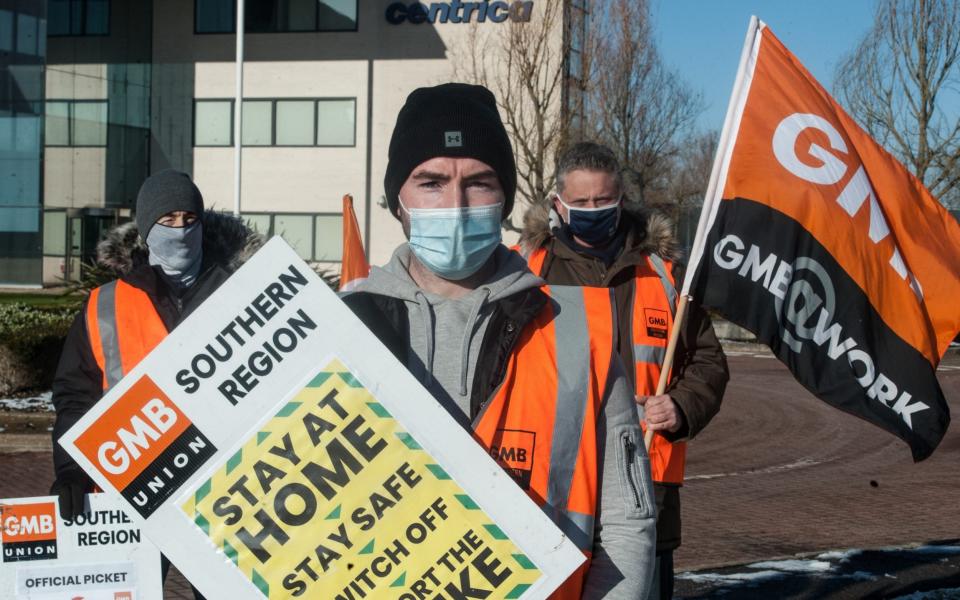
British Gas workers have accepted a new pay deal a year after a bitter strike over the company's fire and rehire scheme.
GMB union members voted overwhelmingly to accept the new offer, which is worth at least 5pc.
Around 7,000 engineers staged 44 days of strikes over several months last year in a clash with parent company Centrica. The union accused the company of forcing employees to take pay cuts or lose their jobs.
Andy Prendergast, GMB National Secretary, said:
GMB worked hard to get the company to start to address the cost of living crisis for workers. We are pleased we have been able to negotiate a deal that helps members and their families.
Like any deal, it is far from perfect but it puts money in workers’ pockets and our reps need to be applauded for the way that they have held the business to account and delivered for their members.
12:19 PM
Wall Street set to rise after two-day sell-off
US futures have gained ground, suggesting there'll be some respite for markets after a two-day sell-off triggered by inflation and growth fears.
Google owner Alphabet, Apple, Meta, Microsoft, Amazon and Tesla all gained between 1.1pc and 1.8pc in premarket trading as tech stocks led the rebound.
Big banks also gained ground, with Citigroup rising 1.2pc.
Futures tracking the tech-heavy Nasdaq jumped 1.3pc, while the S&P 500 was up 1pc and the Dow Jones gained 0.8pc.
Still, the S&P 500 and the Nasdaq are tracking their seventh straight week of losses – their longest losing streak since 2001 – while the Dow is set for its eight consecutive weekly decline, its longest since 1932.
12:11 PM
UK launches free trade talks with Mexico

Britain is launching talks with Mexico over a free trade deal as it looks to ramp up trade after Brexit.
The UK and Mexico agreed a continuation trade deal before Britain left the EU, but that arrangement is based on an EU-Mexico trade agreement negotiated over 20 years ago.
The Government is looking to add services to its current agreement as well as aiming to increase trade in the financial and digital sectors.
A free trade deal with Mexico would also boost the UK's foreign policy tilt towards the Indo-Pacific. Mexico is a member of the Comprehensive and Progressive Agreement for Trans-Pacific Partnership (CPTPP), which Britain wants to join.
Trade minister Anne-Marie Trevelyan said:
Trade deals like this are vital to growing the economy to address the cost of living, as they support jobs, help businesses thrive and spur investment.
11:59 AM
Windfall tax ‘risks hammering investment’
Oil and gas veteran Sir Ian Wood has warned a windfall tax would deter investment in the North Sea at a critical time as experts predicted it would deliver a blow to investment.
Rachel Millard and Tom Rees have more:
Sir Ian Wood said a raid on producers would have a “major negative impact” at a time of concerns around security of supply.
He told BBC Radio 4’s Today programme: “Windfall taxes in the past generally haven’t worked all that well - they’ve been helpful in one year and then there’s been a kind of negative reaction against them and there has to be a corrective period.
“We absolutely must keep our oil and gas industry going for a reasonable period of time, and if we start introducing significant taxation, it will have a major negative impact.
It came as forecasters warned the tax would cause a blow to investment with a risk of even greater long term damage.
Sir Ian led the oilfield services company Wood Group for decades before carrying out a review for the Government in 2013 into maximising economic recovery from the ageing North Sea.
11:09 AM
Russian miner's advisers quit as sanctions bite

In other Russian energy news today, advisers to gold miner Petropavlovsk are said to have quit after only a month as sanctions take their toll.
US-based AlixPartners stepped back from the company earlier this month follow new restrictions on the work that consultants and accountants can carry out for Russian firms, Sky News reports.
BDO, which is based in the UK, has since taken up the role – a move that may raise eyebrows.
It's the latest blow for London-listed Petropavlovsk, which has seen its shares crash 90pc over the last year as investors flee Russian assets.
Last month its main lender Gazprombank demanded that the beleaguered company repay loans worth around $300m after sanctions prevented it from making loan payments.
10:57 AM
What's the EU's stance on paying for Russian gas?
Gas markets have been in turmoil ever since Putin demanded that "unfriendly" nations pay for supplies in roubles, with traders worried the continent could be cut off completely.
Russia has told buyers to open two accounts at Gazprombank – one in euros and one in roubles – so that the lender can convert payments into the local currency. But this raises the prospect of breaching western sanctions.
After weeks of uncertainty, the EU has now outlined its stance on the matter.
It's told countries they can keep buying Russian gas without breaching sanctions, provided they do so in the currency agreed in their existing contracts (usually euros or dollars) and declare the transaction completed when that currency is paid.
But the bloc said opening accounts in roubles at a Russian bank would breach sanctions.
Earlier this week, a spokesman for the European Commission said it was not "advisable" to go beyond this guidance.
10:50 AM
Finland: All customers will get gas
Finland has insisted there'll be no disruption to its gas transmission network and assured customers they'll still receive gas after Russia turned off the taps.
Mika Wiljanen, chief executive of energy firm Gasum, said:
We have been carefully preparing for this situation and provided that there will be no disruptions in the gas transmission network, we will be able to supply all our customers with gas in the coming months.
10:46 AM
Finland loses main gas supply
Putin's decision to turn off the taps leaves Finland without its main source of gas.
In the meantime, supplies continue to flow into Finland via the Balticconnector pipeline from Estonia, but its capacity may not be enough to meet demand.
Still, the impact may well be limited as gas is used for just 5pc of Finland's energy needs. It's mainly used by factories, rather than for heating like in many other European nations.
It comes a week after electricity sales into Finland from Russia ended in what was widely seen as a retaliatory move against the country's decision to seek entry into NATO alongside Sweden.
Finland's state-owned energy firm Gasum said:
Gazprom Export informed Gasum that natural gas supplies to Finland under Gasum’s supply contract will be cut on Saturday.
Gasum will supply natural gas to its customers from other sources through the Balticconnector pipeline.
10:18 AM
Sadiq Khan to sting thousands more drivers in ULEZ expansion
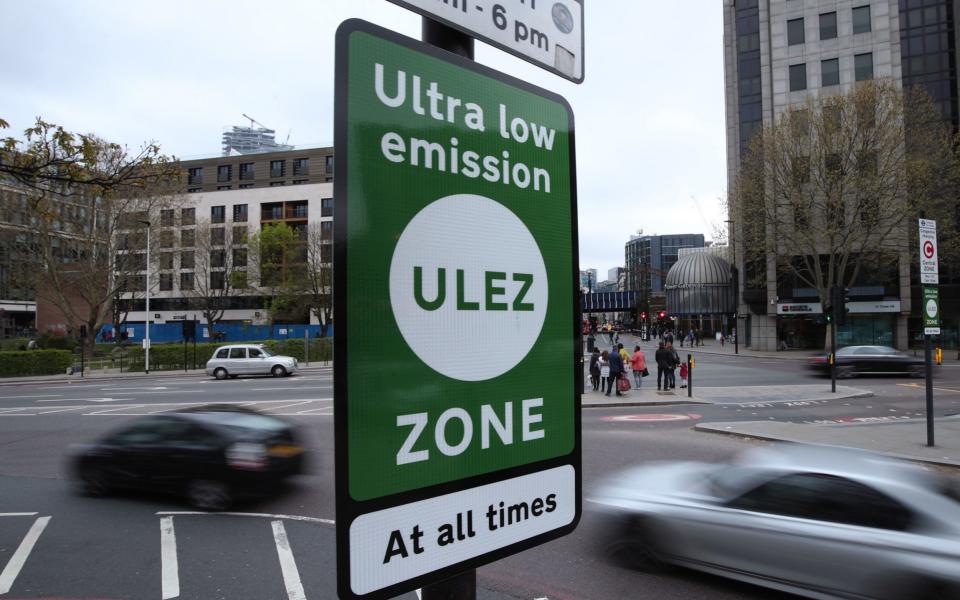
A further 3.5 million Londoners face being caught in Sadiq Khan’s Ultra Low Emissions Zone (ULEZ), at a charge of £12.50 per day, writes Louis Ashworth.
The mayor plans to expand the ULEZ beyond the North and South Circular roads to cover the whole of Greater London, according to proposals put out by City Hall.
An extra 135,000 vehicles would fall within the zone, adding £1.7m a year to the capital’s coffers. Motorists must pay a daily fee of £12.50 to drive in the catchment area.
Mr Khan has launched a consultation conducted by Transport for London into expanding the controversial scheme, which would take effect from August 29 next year.
His office said air pollution was a factor in around 4,000 premature deaths during 2019, with most of those in outer London. It estimates 20,000 to 40,000 fewer from the expansion.
09:56 AM
Bank of England shares responsibility for crisis, says former Governor
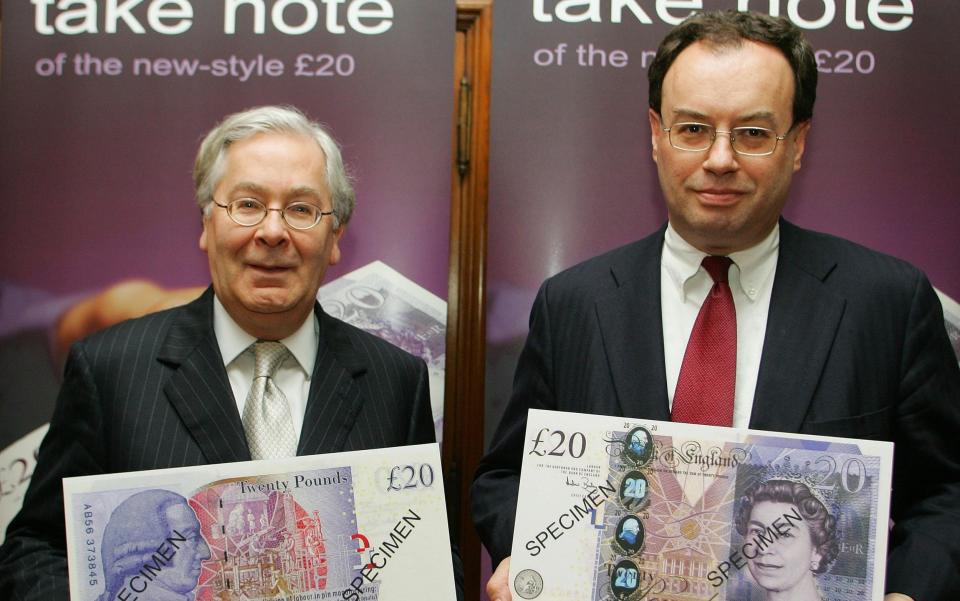
Mervyn King has launched another attack on the Bank of England, saying his former employer must take some responsibility for the current cost-of-living crisis.
The former Governor said the Bank fuelled a rise in inflation by printing too much money during the pandemic.
He told Sky News: "When you get an intellectual mistake in policy, and you allow inflation to rise, if you're then hit by bad luck – which is what happened in the 1970s and is happening now – it becomes a very unpleasant outcome...
"We know what the problem is: monetary policy has been too loose. It needs to be tightened. And the problem for central banks is that, for very understandable reasons, they don't want to say: 'You know, maybe we got it wrong in the last year or so.'"
Mr King added that "considerable" interest rate rises were now needed, warning Britons to brace themselves for a "very unpleasant period" ahead.
Read more on this story: Bank of England has made 'serious mistakes', former Governor says
09:42 AM
G7 to pledge $18bn for Ukraine economy
The G7's financial leaders are expected to unveil billions of dollars in new aid to Ukraine today and promise enough money to keep the country's devastated economy afloat as long as the war continues.
The finance ministers and central bank governors of the US, Japan, Canada, Britain, Germany, France and Italy also are discussing next steps on sanctions to pressure Russia to end the war.
In a draft of the group's communique to be issued later today, the G7 officials pointed to $18.4bn (£14.8bn) of budget support for Ukraine this year, including $9.2bn of recent commitments.
US Treasury Secretary Janet Yellen said: "The message was, 'We stand behind Ukraine'. We're going to pull together with the resources that they need to get through this."
The scheduled meetings also include discussions about the potential for debt crises amid pressures from rising food and energy prices, progress on global corporate tax reform, efforts to finance a transition to renewable energy and a the current state of the pandemic.
09:35 AM
Gas prices drift lower on stockpile boost
Natural gas prices declined as rising stockpiles and steady supplies from Russia offset risk around Moscow's new payment rules.
Benchmark European prices are headed for a weekly loss of about 7pc after closing last night at the lowest level since the day before the invasion.
Gas inventories across the continent are rebounding to near seasonal levels as companies prepare for any potential disruption from a cut-off in Russian supplies. Shipments to Europe are also set to be stable today.
European gas fell as much as 2.2pc, while the UK equivalent was down 6.7pc.
09:12 AM
Extinction Rebellion partly blocks BP oil refinery
Protesters have partly blocked access to BP's oil refinery in Rotterdam in Extinction Rebellion's latest disruptive action.
A spokesman for the oil giant said one of the two main roads to the facility is currently blocked, but refused to say whether its operations were impacted.
In a statement on Twitter, Extinction Rebellion's UK arm said: "The refinery in Rotterdam is one of the largest polluters in the Netherlands and has been shut down today by Extinction Rebellion. It's time to just stop oil."
Breaking: BP Oil refinery blockaded.
The refinery in Rotterdam is one of the largest polluters in the Netherlands and has been shut down today by Extinction Rebellion.
It's time to just stop oil. @NLRebellion @XR_Rotterdam @JustStop_Oil https://t.co/7XMQb41bDE— Extinction Rebellion UK 🌍 (@XRebellionUK) May 20, 2022
08:52 AM
Rouble rallies to highest level since 2018
The rouble has surged to levels not seen since March 2018 as Putin's capital controls help to prop up the market.
The Russian currency has gained nearly 30pc so far this year, despite a full-scale economic crisis, to become the best-performing currency.
That's largely because of artificial controls imposed in late February to shield Russia's financial sector following the invasion of Ukraine.
The rouble was last at 58.90 against the dollar in volatile trade on the Moscow Exchange, after hitting its highest since late March 2018.
08:40 AM
Canada rolls out Huawei ban
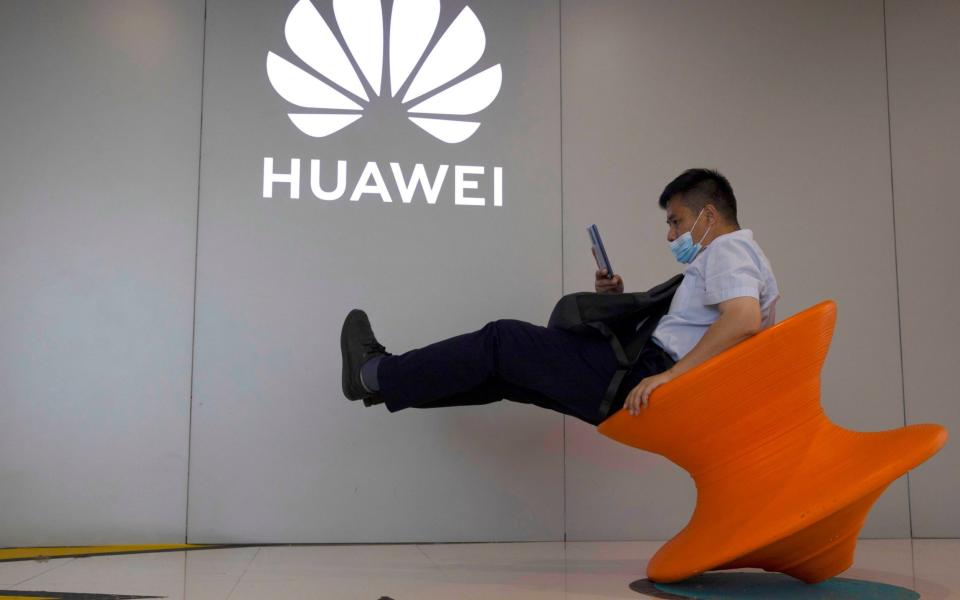
Canada has confirmed it will ban equipment made by controversial Chinese telecoms firm Huawei, following in the footsteps of the rest of the so-called Five Eyes alliance.
Francois-Philippe Champagne, the country's industry minister, said rival ZTE will also be excluded from infrastructure.
Companies will be required to remove their 5G gear by June 2024 and would not be reimbursed. Companies using their 4G equipment must remove it by the end of 2027.
The widely-delayed decision had been delayed amid diplomatic tensions with China. Meng Wanzhou, Huawei's chief financial officer, was arrested in Canada on a US warrant in 2018, creating a long-running dispute with China that finally ended last September with Meng's release.
The rest of the Five Eyes network – which consists of Canada, the US, Britain, Australia and New Zealand – has already banned the equipment.
A spokesman for China's foreign ministry said: "We will take all necessary measures to safeguard the legitimate interests of Chinese firms."
08:12 AM
Pound recovers after retail sales rise
Sterling has edged higher following a surprise increase in retail sales, as investors brushed off data showing consumer confidence has plunged to an all-time low.
The currency was also boosted by comments from Bank of England chief economist Huw Pill, who said more interest rate rises will be needed to tackle surging inflation.
The pound rose 0.2pc against the dollar to $1.2490, putting it on track for a weekly gain of almost 2pc. Against the euro, it gained 0.2pc to 84.72p.
08:00 AM
US growth set to outpace China's for first time since 1976
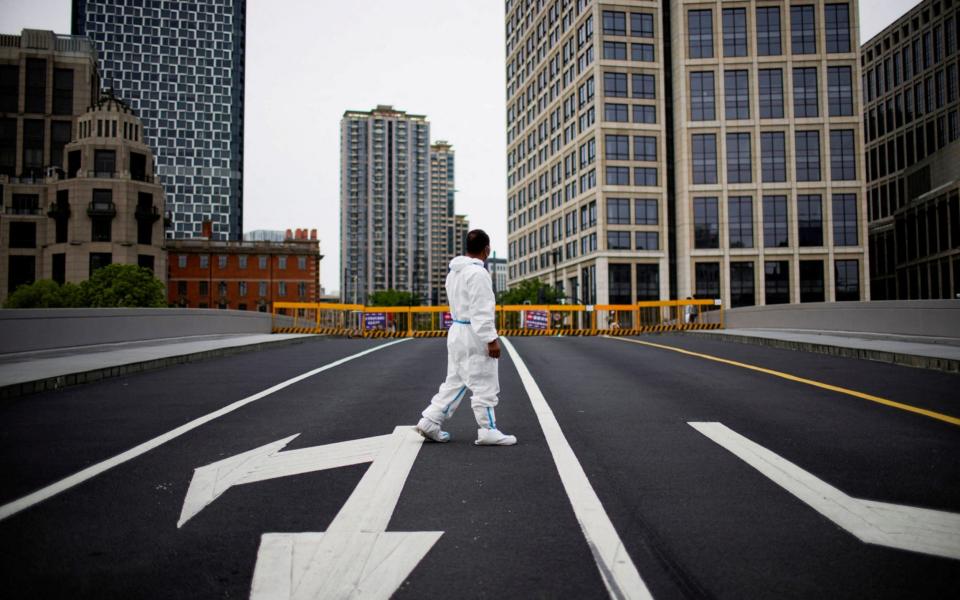
Beijing's brutal zero-Covid policy may mean China's economic growth undershoots the US for the first time since 1976.
That's according to Bloomberg Economics, which predicts the world's second-largest economy will growth just 2pc this year. By contrast, US GDP is expected to increase 2.8pc.
While Beijing has rolled out fiscal, monetary and regulatory stimulus measures, this is being undermined by repeated lockdowns and curbs on activity to tackle virus outbreaks.
While the US is struggling to cope with high inflation, it's still enjoying strong hiring and consumer spending.
If confirmed, it would be the first time China lagged behind its rival since 1976, when it was emerging from the tumultuous decade of the Cultural Revolution.
07:50 AM
Next Fifteen snaps up M&C Saatchi in £310m deal

Consultancy firm Next Fifteen Communications has swooped on M&C Saatchi in a £310m deal after the advertising agency rejected a takeover bid by entrepreneur Vin Murria.
The companies' boards said that they had agreed the takeover at 247.2p per M&C share. The price will be paid by handing shares in NFC to M&C investors.
It's a major increase from the price offered by software tycoon Ms Murria. Earlier this week the company rejected her £254m bid, calling it "derisory" and accusing her of "undervaluing" the agency.
The NFC offer has now been accepted by the board, though it remains to see if shareholders will vote for it, and whether Ms Murria could make another bid.
Moray MacLennan, chief executive of M&C Saatchi, said:
This merger will be a powerful accelerator for M&C Saatchi.
Through connecting with Next Fifteen capabilities and companies, our ability to deliver meaningful change for existing and new clients will be deepened and broadened, turbo charging our next phase of growth.
07:34 AM
FTSE risers and fallers
The FTSE 100 has rebounded strongly this morning as it recovered from a sell-off that rattled global markets yesterday.
The blue-chip index rose 1.3pc in early trading after data showed a surprise increase in retail sales in April.
Still, the overall economic mood remains glum, with a GfK survey showing consumer confidence has crashed to its lowest in at least 48 years.
Oil and banking stocks including Shell and HSBC were the biggest boost to the FTSE 100 after China cut a key lending benchmark by a sharper-than-expected 15 basis points to support a slowing economy.
The domestically-focused FTSE 250 rose 1.1pc. THG jumped 27pc after it rejected a takeover bid and Nick Candy expressed an interest. M&C Saatchi surged 34pc after bosses agreed a takeover by Next Fifteen Communications.
07:29 AM
Elon Musk denies sexually harassing flight attendant on private jet
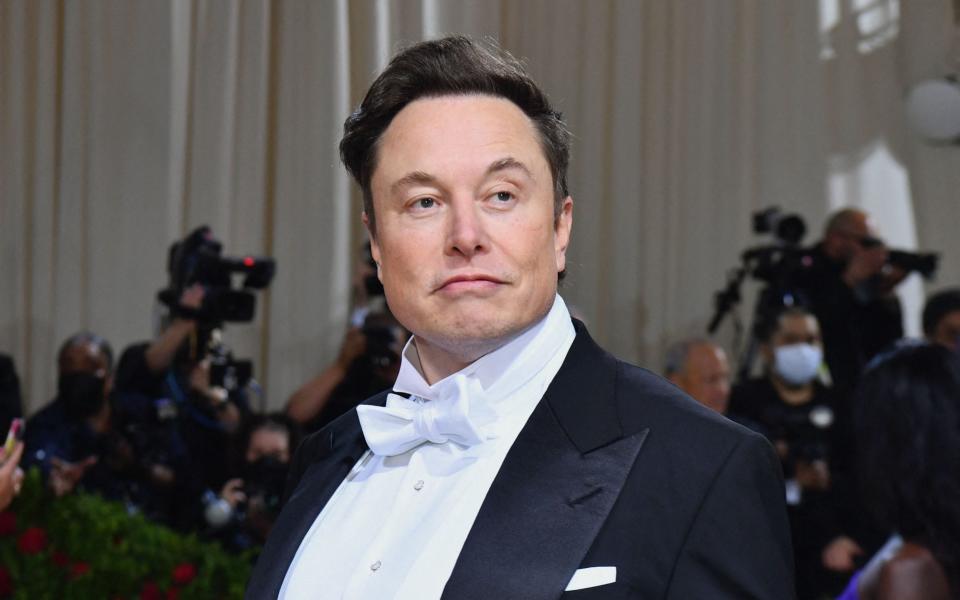
Elon Musk has hit back against "wild accusations" that he sexually harassed a flight attendant on a private jet in 2016.
Business Insider reported last night that Musk's SpaceX paid $250,000 (£200,000) in 2018 to settle a sexual harassment claim from an unnamed private jet flight attendant who accused the billionaire of exposing himself to her.
According to the report, Musk also rubbed the flight attendant's thigh and offered to buy her a horse if she would "do more" during an in-flight massage.
The Tesla chief, who is in the middle of a tumultuous attempt to buy Twitter, wrote on the social media site that the "wild accusations are utterly untrue".
He added: "But I have a challenge to this liar who claims their friend saw me “exposed” – describe just one thing, anything at all (scars, tattoos, …) that isn’t known by the public. She won’t be able to do so, because it never happened."
And, for the record, those wild accusations are utterly untrue
— Elon Musk (@elonmusk) May 20, 2022
07:18 AM
Hinkley Point C to cost an extra £8bn as launch delayed by another year
ICYMI – The French energy company behind Hinkley Point C has warned the nuclear plant will suffer another one-year delay and come in up to £8bn over budget.
Giulia Bottaro and Rachel Millard have the details:
EDF, which will cover the extra costs, said that the price of materials had shot up as a result of the pandemic, a global supply chain crunch and the war in Ukraine.
The company said the two reactors will cost between £25bn and £26bn, up from a previous range of £22bn to £23bn.
It is the fourth budget increase from an initial estimate of £18bn when the contract was signed in 2016.
It was originally scheduled to be ready in 2025, before being delayed to 2026. On Thursday night the plant’s launch was kicked back to 2027.
“People, resources and supply chain have been severely constrained,” EDF said in a statement.
It comes as MPs warned that the Government should “urgently” consider whether to keep open Britain's ageing nuclear power plants in an attempt to tackle the energy crisis.
07:15 AM
THG surges as Nick Candy mulls bid

Shares in THG soared in early trading after the embattled ecommerce group rejected a £2.1bn takeover offer and drew interest from entrepreneur Nick Candy.
The Manchester-based business rebuffed a 170p-per-share offer from ecommerce investor Belerion and US hedge fund King Street Capital Management, saying it significantly undervalued the company.
That came just minutes after property tycoon Candy announced he was considering a bid.
Shares jumped 22pc in early trading.
It's the latest twist in the saga for THG, which has seen its share price plummet since floating in 2020 amid concerns about corporate governance and its growth prospects.
Controversial founder Matthew Moulding said in November that he regretted listing the company, fuelling speculation of a takeover bid to take it private again.
07:02 AM
FTSE 100 rebounds
The FTSE 100 has made strong gains at the open after a surprise increase in retail sales, clawing back some of its losses after yesterday's heavy sell-off.
The blue-chip index rose 1.1pc to 7,383 points.
06:58 AM
Reaction: China lockdowns to rattle supply chains
Aled Patchett, head of retail and consumer goods at Lloyds, points out that lockdowns in China and the war in Ukraine are putting further pressure on supply chains.
Despite a rise in sales for retailers in April, the summer months will bring further challenges for the high street given depressed consumer confidence and the cost-of-living squeeze.
Chinese exports are at a two-year low due to the country’s zero-Covid-enforced lockdowns and, combined with the war in Ukraine, it is likely supply chain volatility and rising goods prices will continue for some time. As a result retailers are increasingly prioritising operational efficiencies to offset their rising input costs.
Consumers will have noticed retailers passing on price increases, in turn impacting their disposable income. This is likely to lead to shoppers trading down in the search for better value and cutting back, which will add to the headwinds faced by retail businesses.
06:54 AM
Capital Economics: More pressure on Bank of England to raise rates
Nicholas Farr, assistant economist at Capital Economics, says the Bank of England will have to act to tackle surging inflation.
The unexpectedly strong 1.4pc rise in retail sales in April suggests that the cost of living crisis hasn’t caused consumer spending to collapse and means that the economy may have a little more momentum than we thought.
It also supports our view that a weaker economy won’t solve the issue of sky-high inflation for the Bank of England without interest rates having to rise much further.
While things are likely to get more difficult for consumers as the squeeze on households’ real incomes from higher inflation intensifies, the signs of resilience in economic activity in the retail sales data are encouraging.
Indeed, although we learnt overnight that the GfK measure of consumer confidence fell to its lowest level since records began in 1974, weak confidence isn’t causing consumer spending to collapse.
This adds weight to our view that the Bank of England will have to raise rates further to bring inflation back down to its 2pc target. We expect interest rates to rise further than most, to 3pc next year.
06:52 AM
Reaction: Retailers having their moment in the sun (for now)
Emma-Lou Montgomery at Fidelity International says the high street is enjoying its last hurrah.
Whether it’s the Jubilee that’s got retailers’ tills jingling, the thrill of shorter working weeks during bank holiday ‘season’, the fact that the sun’s been out, and beers and BBQs are back on the menu, or plain old ‘revenge spending’, the nation’s retailers won’t be complaining about the surge in sales.
For now, at least, retailers are having their moment in the sun. Sales have risen across the board, lifting April sales volumes by 1.4pc.
Certainly, in April the reality of the cost-of-living crisis was put on the backburner. Whether that changes before May is out remains to be seen.
But for now, it seems that not even a 40-year high inflation rate or the threat of a recession, being talked about by the UK’s biggest high street names and the Governor of the Bank of England himself, is putting a dampener on Britons’ new-found spending joy.
06:49 AM
Consumer confidence plunges back to the 70s
While retailers may take some comfort in April's sales figures, the latest measure of consumer confidence is a grim indication of what's to come.
Louis Ashworth has more:
British households are the most downbeat in at least half a century as the cost of living crisis escalates.
GfK’s consumer confidence index, which has run since 1974, dropped to an all-time low of -40 this month, a move that may presage a recession.
It surpassed a previous nadir of -39 reached during the depth of the financial crisis, and means Britons’ outlook has turned darker than amid the Covid-19 lockdowns, and the economic shocks of the ’70s and ’90s.
Joe Staton from GfK said “nothing on the economic horizon shows a reason for optimism any time soon”.
Perceptions of the general economy remain gloomy for the coming year, and consumers’ intentions for major purchases have fallen, a warning sign for retail spending.
06:44 AM
BRC: Difficult times ahead
Helen Dickinson, chief executive of the British Retail Consortium, says shops are under pressure from the squeeze on family finances as well as their own suppliers.
The fall in demand comes as consumers reign in their discretionary spending following a significant reduction to real incomes for households across the UK.
Meanwhile, retailers face higher food and commodity prices, increased shipping and transport costs, and the tightest labour market in decades.
Until inflation is brought to heel, and consumer confidence returns, retailers could be in for some difficult times ahead, with lower demand and reduced margins.
06:43 AM
Lockdowns distort retail spending
Aside from the cost-of-living crisis, retail sales are being influenced by post-pandemic spending habits, as my colleague Tim Wallace explains:
A spring without lockdown means people can go out more than they did a year ago, which may be affecting their purchasing decisions.
Petrol sales were up 1.4pc, recovering partially from March’s 4.2pc drop, as prices briefly dipped from record highs and drivers who had delayed refilling because of the cost eventually had to top up.
Lockdowns distorted spending in favour of physical goods instead of experiences or social events, pushing up retail sales, so now customers are more confident to congregate, this may be depressing shops’ sales by diverting cash to the leisure and hospitality industries.
Overall retail sales remain on a falling trend, despite the recent increase. Shoppers are still buying 3.3pc more than they did pre-Covid, but the gap has been shrinking recently.
In the three months to April sales were down 0.3pc compared to the previous three-month period. On this three-month basis sales have been falling steadily since September last year.
Sales were also down almost 5pc compared to April of last year, when shops were just starting to reopen in the long lockdown, unleashing some pent up spending.
06:40 AM
ONS: Downward trend continues
Heather Bovill at the ONS said:
Retail sales picked up in April after last month's fall. However, these figures still show a continued longer term downward trend.
April's rise was driven by an increase in supermarket sales, led by alcohol and tobacco and sweet treats, with off-licences also reporting a boost, possibly due to people staying in more to save money.
Clothing sales had a strong month, especially online, with some retailers suggesting consumers were purchasing clothes for summer holidays and weddings.
The proportion of online sales crept up a little this month, but despite this increase have predominantly fallen since their peak in early 2021, although they remain well above pre-pandemic levels.
Retail sales volumes increased by 1.4% in April, with the biggest driver coming from food store sales which rose by 2.8%
Retail remains 4.1% above its pre-pandemic level.
➡️ https://t.co/TxVgTlYZp2 pic.twitter.com/ouV38eHXnq— Office for National Statistics (ONS) (@ONS) May 20, 2022
06:34 AM
Retail sales post surprise rise
Good morning.
Retail sales enjoyed a surprise increase in April, defying the wider gloom to rise 1.4pc from a year earlier.
Strong supermarket and clothing sales drove the rise, according to the ONS. That's despite inflation jumping to a 40-year high and consumers facing the biggest fall in living standards for decades.
But overall in the first quarter, sales fell 0.4pc, while April's sales were down 4.9pc year on year.
Analysts warned the high street is facing a tough summer ahead as inflation eats away at margins and the cost-of-living crisis dents consumer spending.
5 things to start your day
1) Billionaires turn on Biden and his ‘party of hate’ The once-strong ties between US Democrats and Silicon Valley, the new heart of American corporate power, have broken down
2) Business chiefs cancel Davos lunch over cost of living crisis CBI calls off meeting normally attended by PM or Chancellor
3) Hinkley Point C to cost an extra £8bn as launch delayed by another year EDF hit by supply chain issues and higher prices for materials
4) Property mogul Nick Candy mulls takeover bid for THG Online retailer receives multiple offers after shares plunge 80pc
5) Plumbing business founder and wife to land £500m fortune Richard and Kate Harpin's company, Homeserve, is being sold to a Canadian asset manager for £4.1bn
What happened overnight
Asian shares jumped in early trade on Friday after China cut a key lending benchmark to support a slowing economy, but a gauge of global equities remained set for its longest weekly losing streak on record amid investor worries about sluggish growth.
MSCI's broadest index of Asia-Pacific shares outside Japan quickly built on early gains after the cut, and was last up 1.4pc.
Chinese blue-chips were 1.1pc higher in early trade and Hong Kong's Hang Seng index jumped more than 2pc, while Australian shares rose 1.3pc. In Tokyo, the Nikkei stock index gained 1pc.
Coming up today
Corporate: Close Brothers (trading update)
Economics: Retail sales (UK), consumer confidence (EU), interest rate decision (China)

